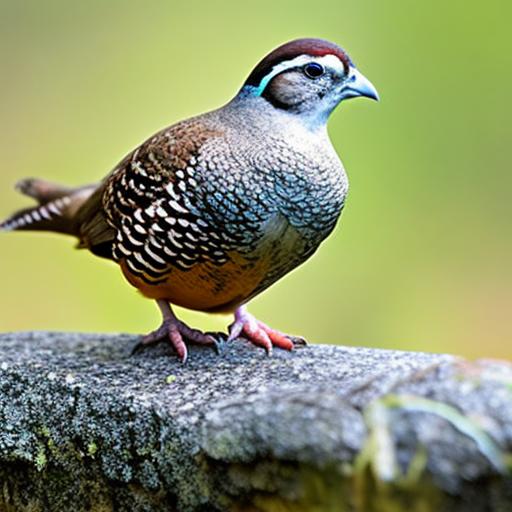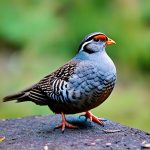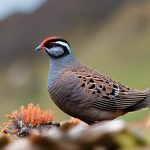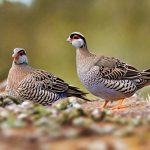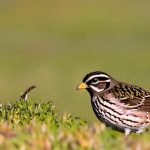Mountain quail, also known as Oreortyx pictus, are a species of bird native to the mountainous regions of western North America. They are known for their striking appearance, with a unique combination of blue, brown, and white feathers. Mountain quail are ground-dwelling birds that prefer to live in dense brush and forested areas, making them well-adapted to the rugged terrain of their natural habitat. These birds are known for their distinctive call, which is often described as a series of loud, ringing notes. Mountain quail are also known for their social behavior, often forming small flocks and foraging together for food.
In recent years, there has been a growing interest in keeping mountain quail as pets in Georgia. While these birds are not as commonly kept as pets as other species of quail, they can make fascinating and rewarding companions for the right owner. However, there are several legal considerations and care requirements that potential mountain quail owners in Georgia should be aware of before deciding to bring these birds into their homes. This article will explore the legal considerations, housing and care requirements, diet and nutrition, socialization and enrichment, and health and veterinary care for mountain quail, as well as provide guidance for potential pet owners considering keeping mountain quail in Georgia.
Key Takeaways
- Mountain quail are a unique and beautiful species of bird native to the western United States.
- In Georgia, it is legal to keep mountain quail as pets with the proper permits and licenses.
- Mountain quail require spacious aviaries with plenty of natural vegetation and hiding spots.
- A balanced diet for mountain quail includes seeds, insects, and fresh greens.
- Socialization and enrichment are important for the mental and physical well-being of mountain quail in captivity.
Legal Considerations for Keeping Mountain Quail as Pets in Georgia
Before deciding to keep mountain quail as pets in Georgia, it is important to be aware of the legal considerations surrounding the ownership of these birds. In Georgia, mountain quail are classified as game birds, and there are specific regulations governing their possession and ownership. It is important for potential pet owners to familiarize themselves with these regulations and ensure that they are in compliance with state and local laws before acquiring mountain quail.
In Georgia, individuals who wish to keep mountain quail as pets must obtain the necessary permits and licenses from the Georgia Department of Natural Resources. These permits are typically required for the possession, transportation, and sale of game birds, including mountain quail. Additionally, there may be specific requirements regarding the housing and care of mountain quail that potential pet owners must adhere to in order to comply with state regulations. It is important for individuals considering keeping mountain quail as pets in Georgia to thoroughly research the legal requirements and seek guidance from the appropriate authorities to ensure that they are in compliance with all applicable laws and regulations.
Housing and Care Requirements for Mountain Quail
Mountain quail have specific housing and care requirements that must be met in order to ensure their health and well-being in a captive environment. When kept as pets, mountain quail require a spacious aviary or enclosure that mimics their natural habitat as closely as possible. This includes providing ample space for the birds to move around and engage in natural behaviors such as foraging and dust bathing. The enclosure should also be equipped with plenty of dense vegetation and hiding spots to provide the birds with security and shelter.
In addition to a suitable enclosure, mountain quail require a diet that is rich in protein and nutrients to support their health and vitality. A balanced diet for pet mountain quail may include a combination of commercial game bird feed, fresh fruits and vegetables, and supplemental sources of protein such as mealworms or crickets. It is important for pet owners to provide their mountain quail with access to clean water at all times and monitor their food intake to ensure that they are receiving adequate nutrition.
Furthermore, mountain quail are social birds that thrive in the company of their own kind. When kept as pets, it is recommended to house mountain quail in small groups to provide them with social interaction and companionship. Additionally, providing enrichment activities such as perches, toys, and opportunities for natural foraging can help keep pet mountain quail mentally stimulated and engaged. Overall, meeting the housing and care requirements for mountain quail requires a commitment to providing a suitable environment that meets their physical, social, and behavioral needs.
Diet and Nutrition for Mountain Quail
A well-balanced diet is essential for the health and well-being of pet mountain quail. In their natural habitat, mountain quail primarily feed on a variety of seeds, insects, and vegetation. When kept as pets, it is important to replicate this natural diet as closely as possible to ensure that the birds receive the nutrients they need to thrive. Commercial game bird feed can serve as a base diet for pet mountain quail, providing essential nutrients such as protein, vitamins, and minerals.
In addition to commercial feed, pet mountain quail can benefit from a variety of fresh fruits and vegetables as part of their diet. Foods such as leafy greens, berries, and chopped vegetables can provide important vitamins and antioxidants to support the overall health of the birds. It is important for pet owners to offer a diverse range of fruits and vegetables to ensure that their mountain quail receive a well-rounded diet.
Supplemental sources of protein such as mealworms or crickets can also be offered to pet mountain quail to mimic their natural diet. These protein-rich treats can be provided in moderation to add variety to the birds’ diet and help meet their nutritional needs. Additionally, it is important for pet owners to provide their mountain quail with access to clean, fresh water at all times to support proper hydration and overall health.
Socialization and Enrichment for Mountain Quail
Socialization and enrichment are important aspects of caring for pet mountain quail. These birds are social by nature and thrive in the company of their own kind. When kept as pets, it is recommended to house mountain quail in small groups to provide them with opportunities for social interaction and companionship. This can help prevent loneliness and boredom, promoting the overall well-being of the birds.
In addition to socialization, providing enrichment activities is essential for keeping pet mountain quail mentally stimulated and engaged. Enrichment can take many forms, including the provision of perches, hiding spots, and toys within the birds’ enclosure. Natural foraging opportunities can also be incorporated into the birds’ daily routine by scattering food throughout the enclosure or hiding treats within toys or puzzle feeders.
Furthermore, allowing pet mountain quail access to a spacious outdoor aviary can provide them with opportunities for natural behaviors such as dust bathing and exploring their environment. Outdoor time can also expose the birds to natural sunlight, which is important for their overall health and well-being. Overall, socialization and enrichment play a crucial role in meeting the behavioral needs of pet mountain quail and promoting their overall quality of life.
Health and Veterinary Care for Mountain Quail

Maintaining the health of pet mountain quail requires regular monitoring and attention to their physical well-being. It is important for pet owners to observe their birds daily for any signs of illness or injury, such as changes in behavior, appetite, or appearance. Additionally, providing a clean environment with proper ventilation and sanitation can help prevent the spread of disease and promote the overall health of the birds.
In the event that a pet mountain quail shows signs of illness or injury, it is important to seek veterinary care from a professional with experience in avian medicine. A qualified veterinarian can conduct a thorough examination of the bird and provide appropriate treatment if necessary. Regular veterinary check-ups can also help ensure that pet mountain quail receive preventative care such as vaccinations and parasite control.
Furthermore, maintaining good hygiene practices within the birds’ enclosure can help prevent common health issues such as respiratory infections or parasites. This includes regular cleaning of food and water dishes, as well as routine cleaning and disinfection of the enclosure itself. Providing a balanced diet, proper housing, socialization, and enrichment can also contribute to the overall health and well-being of pet mountain quail.
Is Keeping Mountain Quail as Pets in Georgia Right for You?
Keeping mountain quail as pets in Georgia can be a rewarding experience for individuals who are willing to meet the legal considerations and care requirements associated with owning these birds. Potential pet owners should carefully consider the commitment involved in providing suitable housing, diet, socialization, enrichment, and veterinary care for mountain quail before making the decision to bring them into their homes.
It is important for individuals considering keeping mountain quail as pets in Georgia to thoroughly research the legal requirements surrounding their ownership and seek guidance from the appropriate authorities to ensure compliance with state regulations. Additionally, providing a suitable environment that meets the physical, social, behavioral, and nutritional needs of pet mountain quail requires a commitment to responsible ownership.
Ultimately, keeping mountain quail as pets in Georgia can be a fulfilling experience for individuals who are dedicated to providing proper care for these unique birds. By understanding the legal considerations and care requirements associated with owning mountain quail, potential pet owners can make an informed decision about whether keeping these birds as pets is right for them.
If you’re considering keeping mountain quail as pets in Georgia, it’s important to understand the specific regulations and requirements for keeping wild birds. In a related article on PoultryWizard, “Garden Chicken Coop: Tips for Creating a Safe and Healthy Environment,” you can find valuable insights into creating a suitable habitat for poultry. Understanding the principles of creating a safe and comfortable environment for chickens can provide helpful guidance when considering the care and housing of mountain quail or other avian species.
FAQs
Can I keep mountain quail as pets in Georgia?
No, it is illegal to keep mountain quail as pets in Georgia. Mountain quail are considered wildlife and are protected under state and federal laws.
Are there any legal requirements for keeping mountain quail as pets in Georgia?
No, it is illegal to keep mountain quail as pets in Georgia, so there are no legal requirements for keeping them.
What should I do if I find a mountain quail in Georgia?
If you come across a mountain quail in Georgia, it is best to leave it alone and not attempt to keep it as a pet. If you believe the bird is injured or in distress, you can contact local wildlife authorities for assistance.
Are there any alternatives to keeping mountain quail as pets in Georgia?
Yes, if you are interested in keeping birds as pets in Georgia, there are many species of domesticated birds that are legal to keep as pets, such as parrots, finches, and canaries. It is important to research and choose a pet bird that is suitable for your lifestyle and living situation.
Meet Walter, the feathered-friend fanatic of Florida! Nestled in the sunshine state, Walter struts through life with his feathered companions, clucking his way to happiness. With a coop that’s fancier than a five-star hotel, he’s the Don Juan of the chicken world. When he’s not teaching his hens to do the cha-cha, you’ll find him in a heated debate with his prized rooster, Sir Clucks-a-Lot. Walter’s poultry passion is no yolk; he’s the sunny-side-up guy you never knew you needed in your flock of friends!

